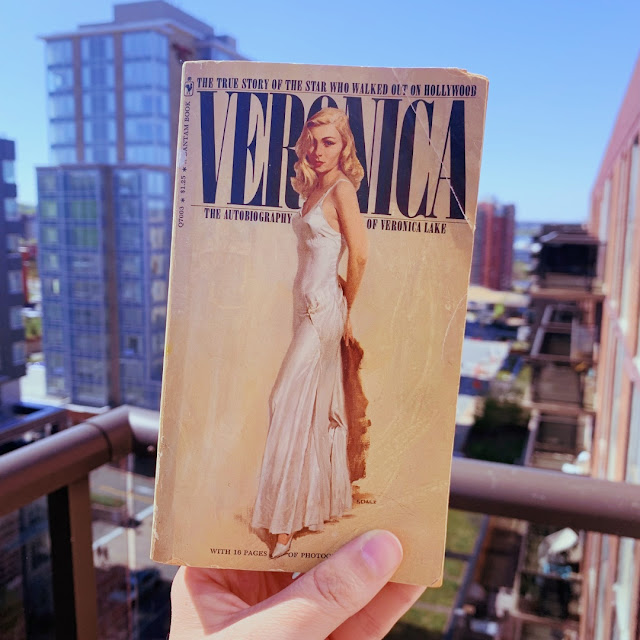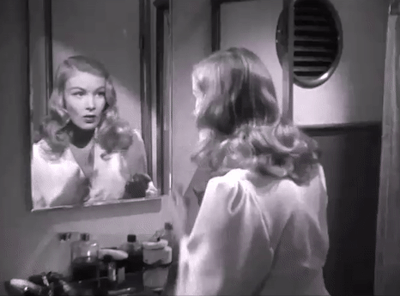#ClassicFilmReading: Veronica: The Autobiography of Veronica Lake by Veronica Lake
Let's kick off this summer's reading pile with one of cinema's most famous blondes (and find out how many times I can put the name Veronica in this blog post title)!
This is my first book for Raquel Stecher's Classic Film Reading Challenge. I look forward to this every summer, and there's still time to join in yourself! Click here to join.
"Veronica Lake is a Hollywood creation," is the first line in this quick autobiography; a fast 276 pages. And over those pages, Veronica—real name Constance Ockelman—spends the entire time deconstructing any idea that the reader might have about her mythology.
She might have had daydreams about becoming an actress as a teenager, when the family first moved to Hollywood, but it was never a passion or a calling...until the '60s when she'd lost it all and wanted it back on her own terms. She wouldn't go back to Hollywood to make films or television, she instead did summer stock and regional television hosting gigs.
And in those 30 years, she gained one of the most iconic hairstyles in film history—"that world famous peek-a-boo, striptease, sheepdog, bad girl hair style," she calls it—and never once put on rose-coloured glasses.
She came up with her stage name with the surname first, determining that it would be Lake. She sassily points out that Lake isn't such an out there name by the time she wrote her autobiography in 1969 because of Tab Hunter and Rock Hudson, but when she was starting out it was considered wild. She was with Arthur Hornblow, Jr., when she came up with Veronica.
Her complicated relationship with her mother is handled from the first pages. Her mother never seemed to like her, blamed her for being born, and when she got famous, sued her for not paying for her upkeep. But she also called her daughter 'Veronica' occasionally, and it was a repressed memory for Veronica until she'd committed to the name.
The image of Veronica Lake is iconic to '40s Hollywood, but she was an outsider by her own admission. She wanted fame but not the trappings that came with it, and made few friends because she was unwilling to play the game. Early in her career she was typecast as the femme fatale and even though she successfully branched out to comedy with Sullivan's Travels (a fave of mine), nobody took her seriously.
By 1951, she writes that she was done with Hollywood. "I decided it was time to make Hollywood a thing of the past. At this point, cynics will say that quite the reverse was true; Hollywood decided it was time to make Veronica Lake a thing of the past."
She doesn't believe that read because she was still receiving scripts. After her second divorce was finalized in 1952, she writes that she never step foot in Hollywood again. She moved to the East Coast and worked odd jobs in summer stock, regional theatre, and local television.
And most infamously, in the '60s, patrons discovered her working as a cocktail waitress at the Martha Washington Hotel (a Barbizon for the working class). Once it made the news, she received fan mail from around the world; and when her movies played on the TV above the bar, nobody drank. It was a pitiful weekend, she writes, when Star-Spangled Rhythm played on Friday, Blue Dahlia played on Saturday, and Sullivan's Travels played on Sunday.
One of the funnier parts of the book is when she talks about how much she likes to cook, and how someday she wanted to write the Veronica Lake Cookbook. Here's her proposed description: it won't "specialize in 1,000 chocolate chip recipes or what to do with leftover potato chips. It will be simple and fraught with easy dishes to whip up when you're drunk or tired or both."
There's sparse Hollywood gossip in here, but there's a lot of focus on her hair. Here are some choice bits as told by Veronica:
- Her head had 150,000 hairs (as reported by Life)
- The front of her hair reached 17 inches in length
- The back of her hair reached 24 inches in length
- She washed her hair every day because it had to be dried and set before she began filming
- She washed it twice in Nuvala shampoo, then once in Maro oil
- She'd rinse it in vinegar because the water in Hollywood was too hard
- She bought a Fuller brush from a travelling salesman once only because her brush had broken an she needed one, and it turned into a national advertisment
- She received a request from the War Manpower Commission to cut her hair for the duration of the Second World War because female factory workers were wearing their hair like hers and getting it trapped in the machinery
- She hated Fredric March (I think that's been well-established), who she worked with on I Married a Witch. She writes: "It's strictly personal."
- When she was hospitalized in 1943 after losing her baby, Katharine Hepburn visited her in the hospital. She told her, "Remember, Veronica, the calla lilies will bloom again."
- She disagrees with actors going into politics and specifically calls out Ronald Reagan and Shirley Temple. She died before she saw a President Reagan, but she did see a Governor Reagan.
- While filming So Proudly We Hail in 1943, the press speculated that she wouldn't get along with either Claudette Colbert or Paulette Goddard and there was betting as to who it'd be. It turned out to be Claudette and Paulette who sparred.
- Bill Dozier tried to woo her while she was in hospital but it never went anywhere. Years later she read a gushing interview from Joan Fontaine about him, after they were married, about how he'd flown up to Canada to visit her in hospital. Veronica joked that he had a type.
- Louella Parsons also hated her and wrote about how unattractive she was. One day at the House of Westmore, Veronica was having her hair set and Louella came in and didn't recognize her. She told the attendant that Veronica was very pretty, to which Veronica yelled, "Why don't you write that in your column?"
- And finally, Miriam Hopkins once told her to never work with Bette Davis because "She's evil." That tracks for Miriam.




I always look forward to your reviews. You always give us the juicy bits. I quite enjoyed the facts about her hair and how it was tied into her identity. I'm really curious about her relationship with Hollywood and how she dealt with her fame. Will have to finally read this one!
ReplyDelete